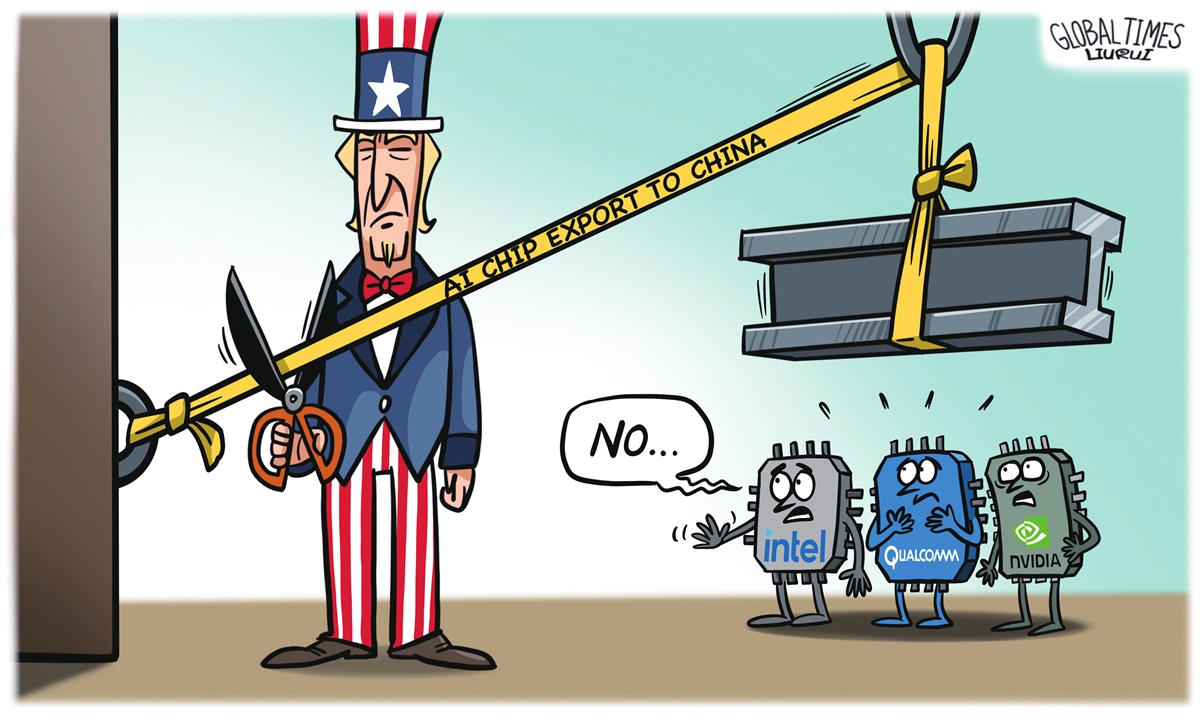‘De-risking’ a cover-up for US’ sinister attempt to ‘de-Sinicize’ important supply chains

Self-destructive. Illustration: Liu Rui/GT
Since China announced export controls on gallium and germanium, two critical elements for making semiconductor chips, the US has reacted strongly, advocating the concept of "de-risking" even more fiercely in an attempt to manipulate public opinion. On Sunday, US National Security Advisor Jake Sullivan stated in an interview that China's restrictions are "a self-defeating move" that will only reinforce the determination of many other countries in the world to de-risk.The hype of "de-risking" from such a high-level US official as Sullivan exposes the true meaning of "de-risking," which is "de-Sinicization."
The extensive control measures imposed by the US on technology exports to China have caused significant damages to Chinese companies. However, the US always believes that it can harm China's interests without paying a price.
In fact, the US is well aware that China's restrictions on the export of gallium and germanium are countermeasures against the US' disruption of the Chinese supply chain. Since 2018, the US has implemented numerous restrictive measures against China. From the restriction of 14 categories of new technology exports in 2018 to export controls on advanced computing and semiconductor manufacturing items issued by the US Department of Commerce in October last year, the tech war initiated by the US has escalated over the past five years. However, the US constantly accuses China of disrupting the supply chain and advocates "de-risking," which is a typical trick of a thief crying "stop thief!"
The various elements in the global industrial and supply chain are interconnected, resulting in economic dependence among countries and inseparable global security. In order to maintain its leadership position, the US has attempted to forcefully cut and reorganize various processes of globalization, causing increasingly severe damage to global economic integration.
Nowadays, the US manipulates public opinion by blaming China's export controls for the disruption of the global supply chain, once again employing the classic American "double standard." However, the whole world can clearly see who is actually undermining the global industrial and supply chain.
The escalating "de-risking" and "de-Sinicization" trend in the US is backfiring on its own interests and has been met with growing domestic resistance. According to Bloomberg, the CEOs of three American chip giants, Intel, Qualcomm, and Nvidia, plan to visit Washington this week to persuade the Biden administration to abandon new restrictions on chip exports to China.
Li Haidong, a professor at the China Foreign Affairs University, told the Global Times that the pursuit of profit in economy and the pursuit of hegemony in strategy are actually in a state of division within the US. The rational and pragmatic approach of US chip giants can promote further integration of the Chinese and American economies and maintain the US technological innovation capabilities. If high-tech companies in the US cannot utilize the vast Chinese market, their profits will ultimately be affected, and the US government will barely be able to provide sufficient compensation for their losses. This will seriously hinder the US' scientific research and innovation capabilities and impede its own technological progress in the long run.
Lü Xiang, a research fellow at the Chinese Academy of Social Sciences, believes that the US has shown some willingness to improve relations with China recently, which could be related to the pressure from the US business community. But the US government is still committed to suppressing China, which only damages its own interests. The US naively believes that by restricting China, the relevant industry chain will be transferred to other countries. However, this has not been the case.
The US has faced opposition from its own companies as well as allied countries as it hyped the so-called decoupling. Nowadays, the US frequently labels its economic and trade activities with China as "risk" and promotes the "de-Sinicization" of key industrial chains and supply chains. In fact, it is practicing "decoupling" from China in the name of "de-risking." China should deal with it with caution in light of the US' hegemonic actions. Lü said that the US has caused significant harm to the global supply chain, and China's countermeasures should be precise while still being prudent and intelligent.
China should actively engage in close contact and communication with other countries to mitigate any potential harm caused by the US. Additionally, China should strengthen its capabilities to effectively counter any unfair and unreasonable crackdown it faces. Once a decision is made, excessive worry should be avoided, and efforts should be focused on maximizing the positive outcomes of that decision.
Regardless of how the US may attempt to tarnish China's decision and promote the concept of de-risking, it is imperative that we hold the US, as well as any countries or entities that collaborate with it to sabotage China's semiconductor supply chain, accountable by imposing necessary consequences. This will send a clear message that China is not to be underestimated.
The author is a reporter with the Global Times. opinion@globaltimes.com.cn

